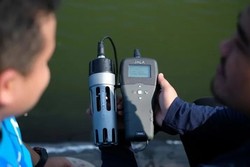
Researchers share how aquaculture AI can help tackle climate challenges
Editor/Mohamed Shihab
Researchers from Taiwan have shared their experiences of using artificial intelligence (AI) when farming finfish and crustaceans and highlighted its potential to provide solutions to the climate crisis.
With the increasing threats of climate change, people are facing dire and irreversible threats on the planet. However, thanks to the innovative and advanced development of artificial intelligence, companies and other stakeholders can make better decisions to mitigate and adapt to these challenges.
On 25 May, Taiwan’s Industrial Development Bureau (IDB) of the Ministry of Economic Affairs (MOEA) and the Centre for AI & Climate co-organised the webinar, Global use of AI in tackling climate change: building resiliency for businesses and societies, to discuss the trending topic of AI and climate. The webinar focused on how to tackle climate change issues with the help of AI. By discussing and exchanging ideas with international organisations and local experts from the AI HUB, the webinar provided an opportunity to broaden the understanding of AI policy, the technology itself and its potential applications.
In the opening remarks, Jiunn-Shiow Lin, the director of the IDB, summarised AI development and strategies in Taiwan, including efforts to assist local companies that want to adopt the technology.The co-founder of the Centre for AI & Climate, Mr Peter Clutton-Brock, portrayed a general picture of using AI to tackle climate change, from emerging technologies to possible solutions. Most importantly, he provided six potential fields in which AI can be the solution to the climate crisis.
In terms of the agricultural production, Dr I-Chun Chang, the general secretary of the Taiwan Smart Aquaculture Glow Association, shared their experience in promoting and implementing intelligent and automated modern production in Taiwanese aquaculture; Alan Yu, the founder of ID Water Technology Co, provided an AI-aid solution in shrimp farming which can boost the economic value compared with the traditional shrimp management methods.
The webinar also featured Dr Vu Thuy Linh, the research fellow of AI for Operations Management Research Center, who carried out an AI sensor system to reduce carbon emissions in smart buildings.
When it comes to solving climate problems, AI has been proven to be an accurate, fast and reliable method to mitigate the effects of climate change on the economy, industry and society. This webinar provided a viewpoint and hands-on experience in how companies can use AI to solve climatic problems across the world and strengthen the resiliency of businesses and societies.


ساحة النقاش